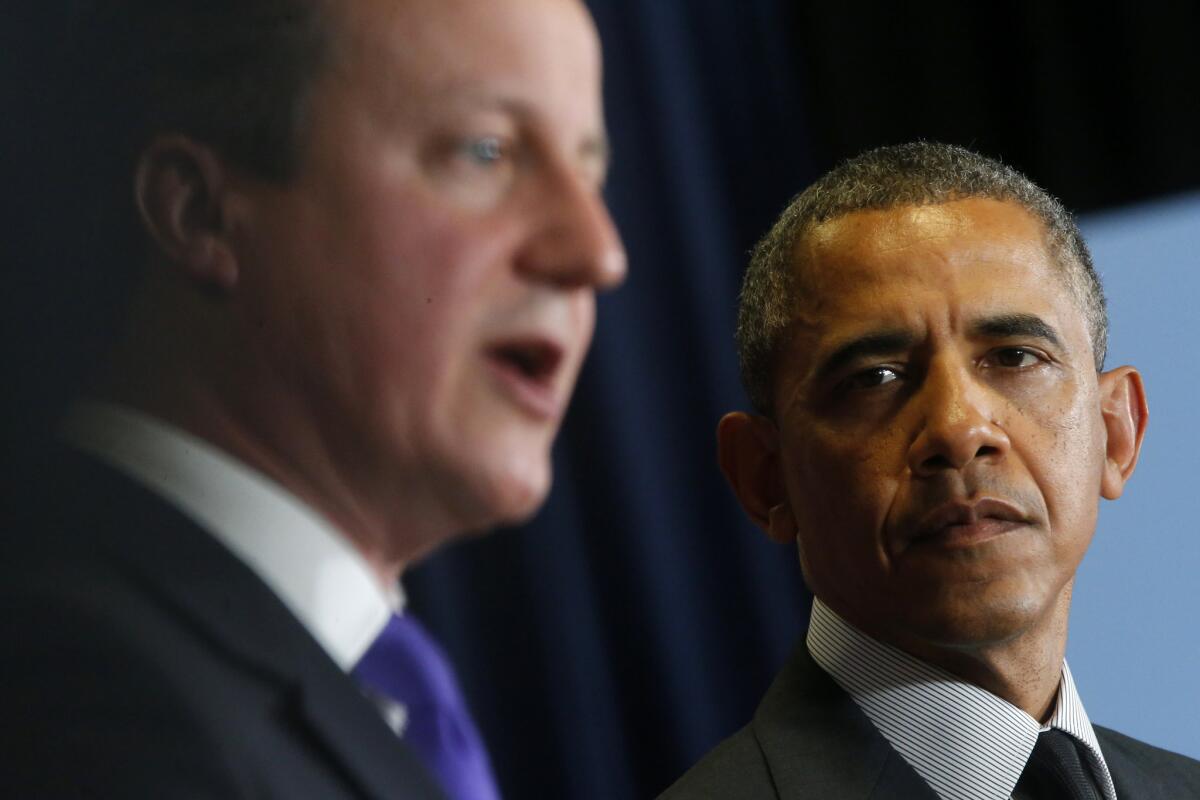Obama, European allies threaten more sanctions on Russia over Ukraine

- Share via
Reporting from Brussels — President Obama and European allies on Thursday threatened additional sanctions in the coming weeks if Russia “continues provocations” in Ukraine, as the president warned against letting the West’s hard line against Moscow “drift.”
Emerging from a day of meetings with leaders of seven major economic powers, Obama said he believed the conflict over control of the former Soviet republic was at a turning point and encouraged President Vladimir Putin to “seize the moment.”
Obama said Putin could avoid further economic penalties if Moscow recognized Ukraine’s newly elected president, stopped the flow of weapons to separatist militias in the eastern part of the country and agreed to work with Kiev on a set of constitutional reforms.
“If Mr. Putin takes those steps, then it is possible for us to begin to rebuild trust between Russia and its neighbors and Europe,” Obama told reporters at a news conference Thursday. “Should he fail to do so, though, there are going to be additional consequences.”
The new threats came after a Group of Seven meeting dominated by talk of the West’s strategy in the Ukraine crisis and disputes over how far to go to pressure Putin. Although the U.S. has focused on isolating the Russian leader -- both politically and economically -- the Europeans have shown signs of growing weary of the effort.
Thursday’s meeting was a chief example of the isolation fatigue. The summit was planned as an elaborate snub, arranged after the leaders canceled a Group of Eight meeting to hosted by Putin in Sochi. They instead gathered in the capital of Europe, minus their eighth member.
But the shutout didn’t last for long. Three of the seven leaders -- German Chancellor Angela Merkel, British Prime Minister David Cameron and French President Francois Hollande -- left Brussels on Thursday and were expected to meet privately with Putin in France within hours.
The Russian president was among dozens of leaders invited to gather on the beaches of Normandy on Friday to mark the 70th anniversary of the D-day invasion and reflect on a high point of East-West cooperation: Allied resistance to Nazi Germany during World War II. The invitation stood even after Putin annexed Ukraine’s Crimean peninsula, a move the West has deemed a violation of international law.
Obama has no plans for a formal meeting with Putin, although the president has acknowledged he will almost certainly speak with Putin at a private luncheon for the leaders Friday. The French president’s dinner meeting with Putin was scheduled, somewhat awkwardly, immediately after Hollande’s plans to dine out with Obama in Paris on Thursday night. (French officials say back-to-back meals isn’t strange: The first is an early dinner; the second comes at dinner on French time.)
The White House says it’s not concerned about the other leaders’ readiness to engage with the man they claim to try to be icing out. Obama has spoken by phone with Putin throughout the crisis, they noted. Speaking at the news conference with Obama, Cameron said the dialogue was appropriate, “particularly if you have a clear message and a clear point to make.”
The message emerging from the Group of Seven, however, was not entirely clear. While Obama and Cameron appeared to agree on the actions Russia could take to avoid additional economic punishment, the formal statement issued by the Group of Seven was not as specific.
The countries “affirmed their readiness to intensify targeted sanctions ... if necessary,” the statement said.
Cameron said Thursday that the penalties would be “sectoral” sanctions -- broad restrictions on whole sectors, such defense, energy or banking. Obama did not detail the type of sanctions being discussed.
There are clear disputes among Western leaders on how tight to turn the economic screws on Moscow -- and where the pain will be felt in Europe. Over U.S. objections, France has charged ahead with the sale of warships to Russia, a deal Hollande has said will generate badly needed jobs. Although Obama downplayed the dispute Thursday, he acknowledged he would prefer it if the French president would “press the pause button.”
To some extent, the discussion and uncertainty around the next phase of the West’s strategy is a result of its success. After Putin annexed Crimea, Europe and the U.S. threatened sectoral sanctions if Putin crossed again into Ukraine. The Russian leader kept his troops on the border. The West then shifted its trigger for the harsh penalties -- threatening the sanctions if Moscow meddled in the May 25 presidential elections. The elections were held without interference from Moscow; leaders now are looking for a new trigger.
“We are at a point where Mr. Putin has a chance to get back into a lane of international law,” Obama said. “Should he fail to do so, though, there are going to be additional consequences, and one of the important things that came out of this meeting today was the recognition on the part of all of us that we can’t simply allow drift.”
More to Read
Sign up for Essential California
The most important California stories and recommendations in your inbox every morning.
You may occasionally receive promotional content from the Los Angeles Times.














